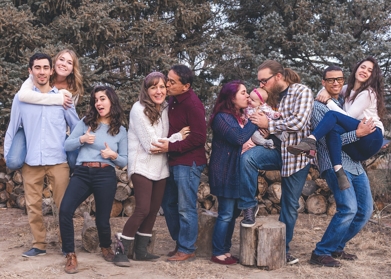 We asked our estate planning attorney, Triston Dallas, to talk our readers through some of the most important red-flags to be aware of when it comes to estate plans and blended families:
We asked our estate planning attorney, Triston Dallas, to talk our readers through some of the most important red-flags to be aware of when it comes to estate plans and blended families:
"Blended families come in many shapes and forms, and each presents a complex and interesting estate-planning question. Blended families may look like:
• Individual with one child marries an individual with no children.
• Individual with two children marries and individual with one child.
• Individual with one child, who also has one child but marries an individual with one child.
• Individual with one adult child, adopts a minor child and also remarries.
• Multiple remarriages with children on both sides.
With more than 50% of American marriages ending in divorce (leading to a lot of remarriages), and more than 30% of married couples having children, the potential for issues without estate planning for a blended family become glaring. Without a plan, children (or stepchildren) can be inadvertently disinherited or have a delay in receiving an inheritance, assets may not be protected from former spouses, and litigation regarding the division of property can ensue.
While the most common situation of a blended family estate planning issue is when an individual wants to provide for their new spouse and their children of previous marriage; here are some additional examples where issues arise:
Example 1: Jack, who is 48, has two children, John (age 18), and Jamie (age 18), twins. Jack is currently paying for his children’s college tuition. Jack marries Liz (age 50) who has no children. Shortly after marriage, Jack creates a basic Will that leaves everything to Liz, believing she will take care of his children in the event of his passing. Jack passes away a year later, Liz inherits everything and becomes estranged from John and Jamie.
Example 2: Retired couple Jack (age 68) and Liz (age 67) get married, a second marriage for both of them. Before getting married to Liz, Jack’s two adult children, John and Jamie, helped Jack build a home for Jack to live in with the idea that they would inherit the home back after Jack dies. The home is in Jack’s name alone. Liz has two adult children, Larry and Linda. Jack updates to deed to the home to add Liz’s name. Jack dies with no will.
Example 3: Jack (age 60) marries Liz (age 30). Jack has two adult children from a previous marriage, John and Jamie. Jack wants to make sure he provides for Liz so he creates a trust where John and Jamie are remainder beneficiaries, after Liz. Jack passes away and Liz begins to live an extravagant lifestyle with the funds and assets left by Jack, quickly diminishing the trust funds. John and Jamie believe they will be effectively disinherited so they seek litigation to prevent Liz from spending the entire trust fund.
Example 4: Jack (age 45) marries Liz (age 52). Both Jack and Jill have minor children from a previous marriage, and both are very loving of the other’s children. Liz creates a Will on her own and leaves everything to Jack. Liz passes away, and Jack inherits Liz’s estate. Jack passes away 3 years later with no will. Liz’s children inherit nothing.
These examples show that without a Will or trust, Oregon law on its own will not cover all situations for blended families; additionally, even with a Will or trust, without proper planning, family members you care about may not receive an inheritance as you may have hoped. There are many options individuals and families have to alleviate these potential issues, such as: a Qualified Terminable Interest Property Trust, Disclaimer Trusts, Irrevocable Life Insurance Trusts, or Premarital or Marital Agreement. While there are certainly complications that can arise when creating an estate plan as a blended family, take heart in knowing that there are also solutions, which an experienced estate planning attorney can help you navigate."
If you have a blended family and would like to speak with Triston about your unique situation and how he can help you, our firm is offering a free strategy meeting with Triston for the month of April. Call us today at (503) 227-0200 to set up your meeting, and to begin the process of ensuring that you and your family are set up for success in years to come.
It is important for families to recognize potential issues as presented above; however, this article is not a substitution for legal advice. If you have questions, please seek out an estate planning or elder law attorney for assistance. We assume no responsibility for errors, omissions, or damages resulting from the use of the above information or explanations.

